Redditors React To A Story About A Father Who Punished His Children By Rehoming Their Dog
Regardless of whether it was a dog, cat, or fish, everyone can recall their very first pet. Raising an animal comes with a lot of responsibility, especially if you've never done it before.
Unless your pet is a fish, of course, you must take frequent walks, adhere to rigorous feeding schedules, and play with the animal regularly (every day, maybe even multiple times per day) to burn off energy. Not everyone, though, is as ready for this experience as others.
In this instance, a parent gave in after much prodding from his wife and two children and ultimately decided to purchase the family a dog. The boys, who were ages 10 and 14, ought to have been able to care for a dog.
Additionally, these children had nothing to worry about because their mother was on their side. However, they made a mistake, and their father realized the dog wasn’t getting walked or fed frequently enough after about five months.
How would you react in this circumstance? You made a strong agreement with your kids that they wouldn’t be allowed a dog unless they could take care of it, and now you’re too busy working to take care of the dog yourself.
Would you intervene, or would you give the boys another chance? In this instance, the OP acted as if the dog was his, and he transported it to his in-laws’ house down the street.
I don't like animals in general as they freak me out
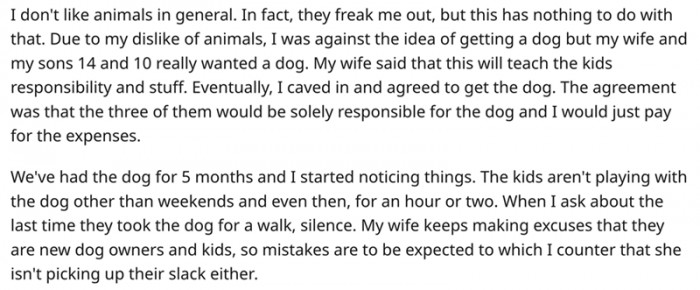
The dog has been enjoying every moment since its arrival, but the OP’s family hasn’t stopped criticizing him. He resorted to Reddit to find out if he had been overly severe in his decision.
Before you draw your own conclusions, listen to him explain it all and then read what the Redditors have to say.
In examining the psychological principles behind the reactions to a parent's decision to rehome a pet, it becomes clear that this situation is complex and layered with emotional implications. Research in family psychology suggests that children's attachment to pets can serve as a secure base for emotional development (Bowlby, 1982). When that attachment is abruptly severed, it can disrupt a child's sense of security, leading to anxiety and behavioral changes.
For parents navigating such decisions, experts recommend considering alternatives to rehoming, such as involving children in the decision-making process regarding pet care. This approach not only teaches responsibility but also affirms children's emotional needs, emphasizing the importance of open communication and mutual respect in family relationships.
He's not been getting lunch and gets irregular breakfast

They've already failed a few times

Understanding the Emotional Impact of Pet Loss
Research indicates that pets often occupy a significant emotional space within a family, serving not only as companions but also as sources of unconditional love and support. A study published in the Journal of Applied Animal Welfare Science found that the loss or removal of a pet can trigger profound grief responses, similar to those experienced after the loss of a human family member. This is particularly true for children, who may struggle to articulate their feelings around such loss, leading to emotional dysregulation and behavioral issues.
In situations where a parent decides to rehome a pet as a form of punishment, it can exacerbate feelings of abandonment and betrayal among children. According to clinical psychologist Dr. Susan Whitbourne, these incidents can foster long-term attachment issues and fear of abandonment, which may manifest in future relationships.
Reading this story at the beginning, one might be convinced that this person was an a**hole. Who, specifically on Reddit, brags about not being a fan of animals?
But then, you begin to lean more and more in his direction as he continues to talk about how his kids behaved when caring for their dog. We’ve gathered some of the most upvoted comments from Redditors, so go ahead and read them all.
So many people who get pets are irresponsible and terrible owners
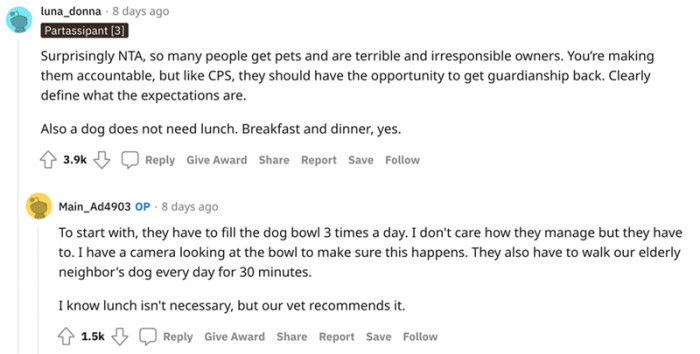
The dog should stay where it's loved

The OP went ahead to add some updates later on
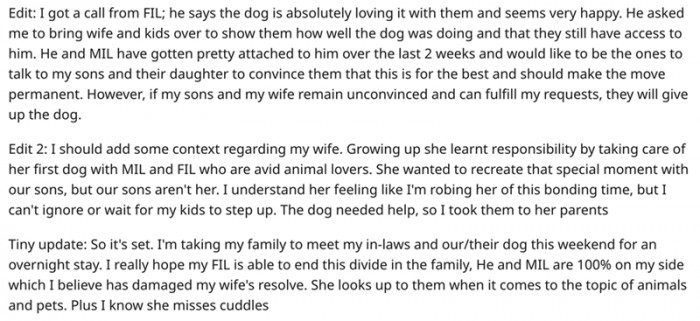
Behavioral psychology teaches us that punishment, especially in a family context, can lead to unintended consequences. Research shows that punitive measures often fail to instill the desired behavior and can instead lead to resentment, anxiety, and withdrawal (Hoffman, 2006). A clinical psychologist noted that when children are punished through the removal of a beloved pet, they might not learn the intended lesson but instead internalize feelings of worthlessness and confusion.
To foster healthier relationships and teach responsibility, experts recommend using positive reinforcement strategies instead of punitive ones. This could include rewarding children for demonstrating responsibility in caring for their pet, thereby reinforcing good behavior while maintaining the emotional bonds that pets foster within the family.
Not walking a dog is one thing, and it's a lot, but not feeding it is an entirely different level of abdicating your duty. Well, continue reading to find more entertaining comments below!
You did the right thing by giving the dog up
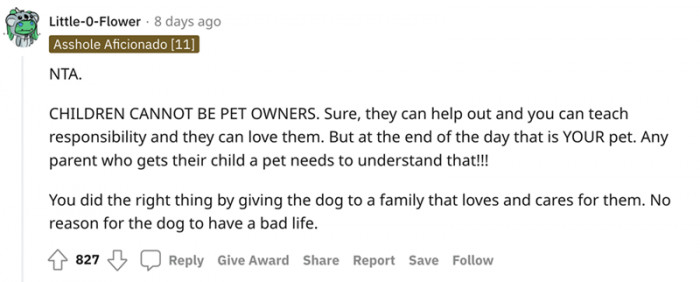
Parents are responsible, but the kids aren't toddlers
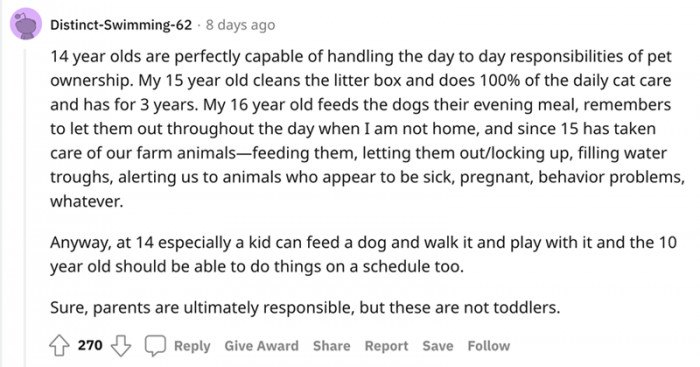
The dog is a living being and deserves respect

The Role of Empathy in Parenting Decisions
Empathy plays a crucial role in effective parenting, influencing how parents make decisions that impact their children's emotional well-being. Research from the University of Michigan highlights that parents who model empathetic behavior help their children develop similar skills, fostering emotional intelligence and resilience (Gordon & Arbuthnot, 1988). When a parent chooses to rehome a pet as punishment, it can reflect a lack of empathy, potentially damaging the parent-child relationship.
Dr. Brené Brown emphasizes the importance of vulnerability and connection in parenting, suggesting that fostering empathy can lead to more compassionate family dynamics. By including children in discussions about pet care and consequences, parents can encourage a deeper understanding of emotions and responsibility, creating an environment where mistakes become learning opportunities rather than sources of shame.
Dogs are a huge responsibility

We’re not shocked that this man behaved the way he did by removing the dog from the house. Come on, who wouldn’t?
They clearly had a deal, and the OP’s family couldn’t keep to their end of the bargain. But then, what are your thoughts about this story?
Leave your replies in the comments section below.
Psychological Analysis
This situation highlights the complex interplay of responsibility and emotional attachment in family dynamics. When a parent uses the rehoming of a pet as a form of punishment, it can create feelings of abandonment in children, which may lead to long-term emotional issues. Instead of punitive measures, involving kids in caring for the pet could teach responsibility while reinforcing their emotional bonds within the family.
Analysis generated by AI
The emotional landscape surrounding pets in family life is intricate and deeply tied to children's developmental needs. Studies consistently show that decisions impacting these bonds must be made with careful consideration of the emotional repercussions, as they can influence self-esteem and attachment styles in the long run. Research indicates that nurturing empathetic communication and involving children in responsibility-building exercises can lead to healthier family dynamics.
Ultimately, fostering a secure and understanding environment not only benefits the children involved but also strengthens familial bonds, allowing everyone to grow together through challenges rather than experience them as isolating events.



